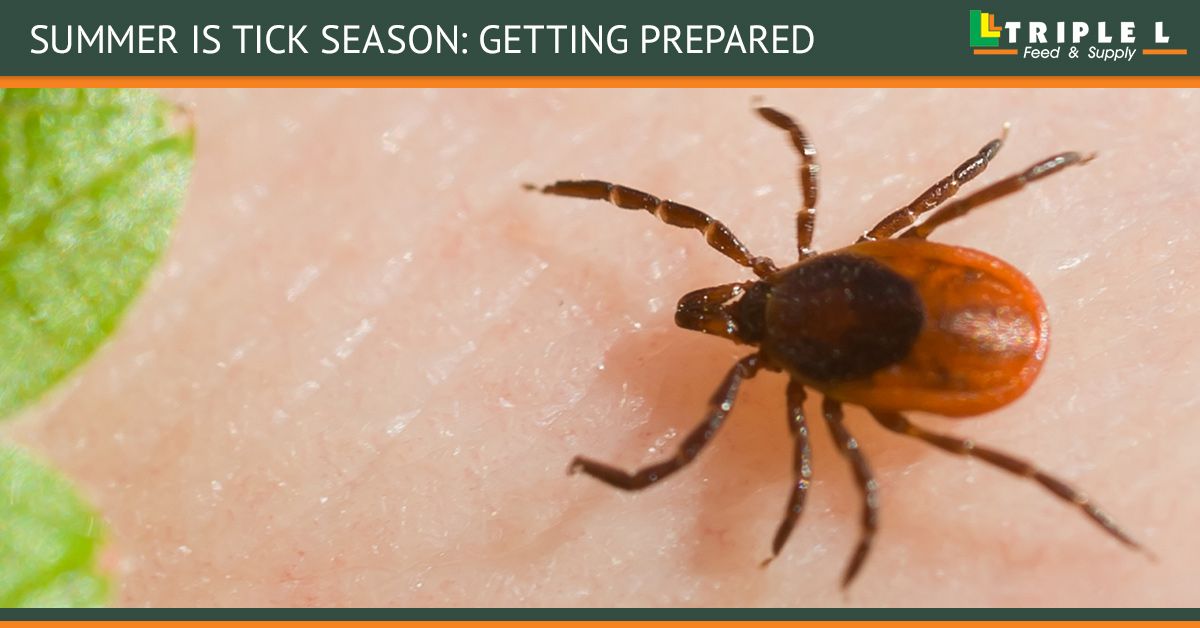
Summer is Tick Season: Getting Prepared
Protect Yourself from Ticks!
If you’ve ever gone tromping through tall grass as a kid, you know just how annoying ticks can be. More than that, ticks are also common disease carriers, which is why it’s so important to check yourself for ticks after time spent outdoors.
But ticks can be a bother — and a potential health concern — for more than just people; they’re also disease carriers that can impact cats, dogs, horses, cattle, and other animals. Here’s what you need to know about protecting your animals from ticks this season:
Ticks and Disease
The major concern for humans is that ticks carry Lyme disease. Well, Lyme disease can also affect horses and dogs, and it will affect them similarly to the human response — with joint pain, lethargy, fever, and stiffness. But Lyme disease isn’t the only nasty thing ticks can carry. Different types of ticks are carriers for different diseases, so you’ll need to start by knowing which types of ticks are most common in your area, and which diseases they are most likely to carry. Understanding this will help you better keep an eye out for signs of infection in your horses, cattle, and other animals.
Here in Marana and in the greater Tucson area, our most common tick is the brown dog tick. You may also find Rocky Mountain wood ticks around northern Arizona. Both species of tick can carry Rocky Mountain spotted fever and tick-borne relapsing fever as well as Lyme disease and tularemia — though the latter two are much less common.
Preventing Disease Spread by Ticks
When it comes to staving off disease, this is where a tick’s nature works in our favor. The good news is that a tick generally has to be attached for several hours before it transmits a disease. So, assuming you check for ticks soon after coming in from the fields, that cuts way down on the risk of contracting a tick-borne disease. Of course, this isn’t exactly an easy option when you have a whole herd of cattle to check. So what do you do to help your herd avoid contagion?
There are plenty of tick-repellant options you can pick up from your local feed store, including medications, shampoos, dips, and other topical treatments. But again, these options can be time consuming when you have a bunch of animals who need the preventative treatment. In addition to those methods, there are also a few things you can do around your property to reduce the spread of ticks.
Those options include:
- Cutting back tall grass and bushes — You may not be able to mow down all of your fields, but the more you can trim back overgrown areas, the better. Focus your efforts around your home and barn first, so you can minimize the risk of ticks getting at your livestock while they’re in such a centralized location.
- Checking your animals — While it’s time consuming, this is still the best way to minimize the spread of tick-borne diseases. If you don’t have the time or manpower to search all over each animal, focus your attention on the “predilection sites,” or places that ticks are most likely to attach because of the good access to a blood source. Those sites include the armpits, groin, and behind the jaw/ears.
- Clear up moist patches — This isn’t as much of a concern here in Arizona, but ticks thrive more in moist climates and places that offer crevices for them to hide in. Do what you can to clear away old leaves and underbrush before it has a chance to start breaking down.
- Spray for pests — Using a pest-removal spray or other treatment around your home, barn, and other structures can also help keep ticks at bay, and prevent them from settling in and laying eggs in those areas. Just be sure you find a spray that’s safe or plan to keep your animals away from recently treated areas for the recommended time.
Whether you’re facing trouble from ticks or you’re looking for better cattle feed, start with Triple L Feed and Supply of Tucson. We’ve got a wide range of the best brands for animal feed, hay for sale, and we can order whatever you need if we don’t have it in stock. Give us a call or come by one of our two locations in Marana today!
